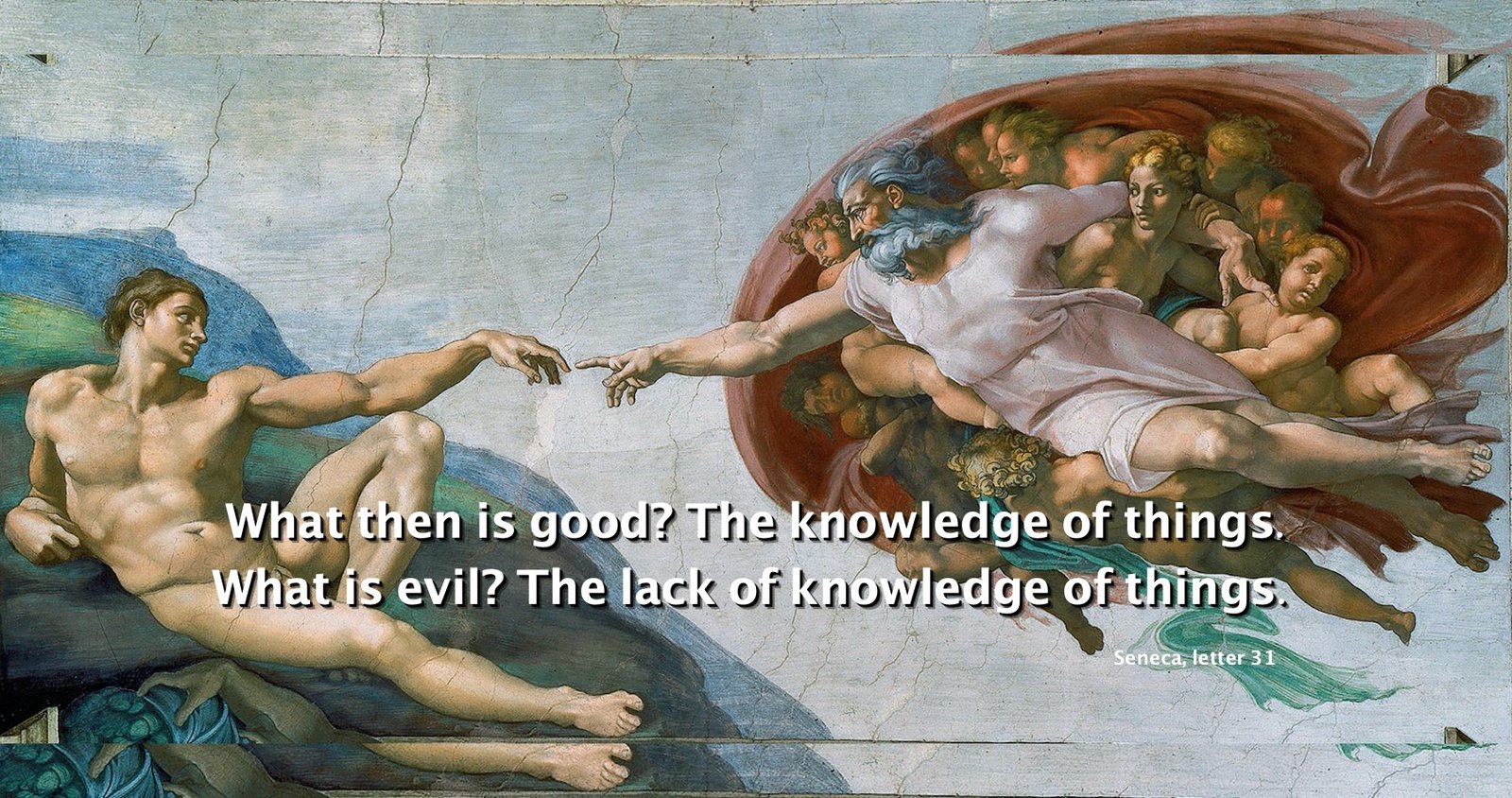In letter 33 Seneca addresses our responsibility regarding the legacy we shall leave. It prescribes a thorough study of the wisdom of our distinguished ancestors:
“For this reason, give over hoping that you can skim, by means of epitomes, the wisdom of distinguished men. Look into their wisdom as a whole; study it as a whole. They are working out a plan and weaving together, line upon line, a masterpiece, from which nothing can be taken away without injury to the whole. Examine the separate parts, if you like, provided you examine them as parts of the man himself. She is not a beautiful woman whose ankle or arm is praised, but she whose general appearance makes you forget to admire her single attributes.” (XXXIII,5)
However, after a certain point, we must ourselves create new knowledge, using as a foundation the knowledge acquired from renowned masters:
“But what is your own opinion? How long shall you march under another man’s orders? Take command, and utter some word which posterity will remember. Put forth something from your own stock“. (XXXIII,7)
I very much like the last section, which represents the synthesis of the conservative thought, that is, we must broaden and improve society by always preserving the fundamental traditions:
“What then? Shall I not follow in the footsteps of my predecessors? I shall indeed use the old road, but if I find one that makes a shorter cut and is smoother to travel, I shall open the new road. Men who have made these discoveries before us are not our masters, but our guides. Truth lies open for all; it has not yet been monopolized. And there is plenty of it left even for posterity to discover.” (XXXIII,11)
(image: La Tache noire by Albert Bettannier)
XXXIII. On the Futility of Learning Maxims
1. You wish me to close these letters also, as I closed my former letters, with certain utterances taken from the chiefs of our school. But they did not interest themselves in choice extracts; the whole texture of their work is full of strength. There is unevenness, you know, when some objects rise conspicuous above others. A single tree is not remarkable if the whole forest rises to the same height.
2. Poetry is crammed with utterances of this sort, and so is history. For this reason I would not have you think that these utterances belong to Epicurus: they are common property and are emphatically our own.[1]They are, however, more noteworthy in Epicurus, because they appear at infrequent intervals and when you do not expect them, and because it is surprising that brave words should be spoken at any time by a man who made a practice of being effeminate. For that is what most persons maintain. In my own opinion, however, Epicurus is really a brave man, even though he did wear long sleeves.[2] Fortitude, energy, and readiness for battle are to be found among the Persians,[3] just as much as among men who have girded themselves up high.
3. Therefore, you need not call upon me for extracts and quotations; such thoughts as one may extract here and there in the works of other philosophers run through the whole body of our writings. Hence we have no “show-window goods,” nor do we deceive the purchaser in such a way that, if he enters our shop, he will find nothing except that which is displayed in the window. We allow the purchasers themselves to get their samples from anywhere they please.
4. Suppose we should desire to sort out each separate motto from the general stock; to whom shall we credit them? To Zeno, Cleanthes, Chrysippus, Panaetius, or Posidonius? We Stoics are not subjects of a despot: each of us lays claim to his own freedom. With them,[4] on the other hand, whatever Hermarchus says, or Metrodorus, is ascribed to one source. In that brotherhood, everything that any man utters is spoken under the leadership and commanding authority [5] of one alone. We cannot, I maintain, no matter how we try, pick out anything from so great a multitude of things equally good.
Only the poor man counts his flock.[6]
Wherever you direct your gaze, you will meet with something that might stand out from the rest, if the context in which you read it were not equally notable.
5. For this reason, give over hoping that you can skim, by means of epitomes, the wisdom of distinguished men. Look into their wisdom as a whole; study it as a whole. They are working out a plan and weaving together, line upon line, a masterpiece, from which nothing can be taken away without injury to the whole. Examine the separate parts, if you like, provided you examine them as parts of the man himself. She is not a beautiful woman whose ankle or arm is praised, but she whose general appearance makes you forget to admire her single attributes.
6. If you insist, however, I shall not be niggardly with you, but lavish; for there is a huge multitude of these passages; they are scattered about in profusion, – they do not need to be gathered together, but merely to be picked up. They do not drip forth occasionally; they flow continuously. They are unbroken and are closely connected. Doubtless they would be of much benefit to those who are still novices and worshipping outside the shrine; for single maxims sink in more easily when they are marked off and bounded like a line of verse.
7. That is why we give to children a proverb, or that which the Greeks call Chria,[7] to be learned by heart; that sort of thing can be comprehended by the young mind, which cannot as yet hold more. For a man, however, whose progress is definite, to chase after choice extracts and to prop his weakness by the best known and the briefest sayings and to depend upon his memory, is disgraceful; it is time for him to lean on himself. He should make such maxims and not memorize them. For it is disgraceful even for an old man, or one who has sighted old age, to have a note-book knowledge. “This is what Zeno said.” But what have you yourself said? “This is the opinion of Cleanthes.” But what is your own opinion? How long shall you march under another man’s orders? Take command, and utter some word which posterity will remember. Put forth something from your own stock.
8. For this reason I hold that there is nothing of eminence in all such men as these, who never create anything themselves, but always lurk in the shadow of others, playing the rôle of interpreters, never daring to put once into practice what they have been so long in learning. They have exercised their memories on other men’s material. But it is one thing to remember, another to know. Remembering is merely safeguarding something entrusted to the memory; knowing, however, means making everything your own; it means not depending upon the copy and not all the time glancing back at the master.
9. “Thus said Zeno, thus said Cleanthes, indeed!” Let there be a difference between yourself and your book! How long shall you be a learner? From now on be a teacher as well! “But why,” one asks,[8] “should I have to continue hearing lectures on what I can read?” “The living voice,” one replies, “is a great help.” Perhaps, but not the voice which merely makes itself the mouthpiece of another’s words, and only performs the duty of a reporter.
10. Consider this fact also. Those who have never attained their mental independence begin, in the first place, by following the leader in cases where everyone has deserted the leader; then, in the second place, they follow him in matters where the truth is still being investigated. However, the truth will never be discovered if we rest contented with discoveries already made. Besides, he who follows another not only discovers nothing but is not even investigating.
11. What then? Shall I not follow in the footsteps of my predecessors? I shall indeed use the old road, but if I find one that makes a shorter cut and is smoother to travel, I shall open the new road. Men who have made these discoveries before us are not our masters, but our guides. Truth lies open for all; it has not yet been monopolized. And there is plenty of it left even for posterity to discover.
Farewell
Footnotes
- ↑ Stoic as well as Epicurean.
- ↑ Contrasted with alte cinctos. The sleeveless and “girt-up” tunic is the sign of energy; cf. Horace, Sat. i. 5. 5, and Suetonius, Caligula, 52: the effeminate Caligula would “appear in public with a long-sleeved tunic and bracelets.”
- ↑ Who wore sleeves.
- ↑ i.e., the Epicureans.
- ↑ For the phrase ductu et auspiciis see Plautus, Amph. i. 1. 41 ut gesserit rem publicam ductu imperio auspicio suo; and Horace, Od. i. 7. 27 Teucro duce et auspice Teucro. The original significance of the phrase refers to the right of the commander-in-chief to take the auspices.
- ↑ Ovid, Metamorphosis, xiii. 824.
- ↑ Either “maxims” or “outlines,” “themes.” For a discussion of them see Quintilian, Inst. Orat. i. 9. 3 ff.
- ↑ The objector is the assumed auditor. The answer to the objection gives the usual view as to the power of the living voice; to this Seneca assents, provided that the voice has a message of its own.










